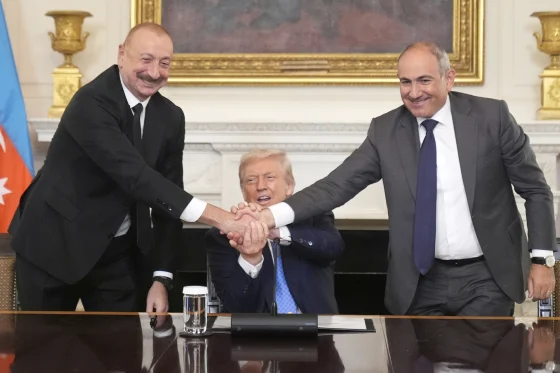US Lifts Weapons Restrictions on Azerbaijan: A New Era for Defense Trade and Tech Innovation

US Lifts Weapons Restrictions on Azerbaijan: A New Era for Defense Trade and Tech Innovation
Introduction
In a landmark development for South Caucasus geopolitics, the United States has lifted longstanding restrictions on military cooperation with Azerbaijan, paving the way for unrestricted arms trade and technology transfers. This move, announced by President Donald Trump on August 8, 2025, during a White House summit, is part of a broader US-brokered peace agreement between Azerbaijan and Armenia aimed at ending decades of conflict over Nagorno-Karabakh. The agreement not only commits both nations to cease hostilities "forever" but also opens new economic opportunities, particularly for US startups specializing in artificial intelligence (AI) and unmanned aerial vehicles (UAVs).
This policy shift removes barriers that have limited US-Azerbaijan defense ties since the early 1990s, allowing private American companies to engage in weapons systems trade without the need for annual waivers. As Azerbaijan seeks to modernize its military and diversify its arms suppliers beyond traditional partners like Israel and Turkey, US firms—especially agile startups—are poised to capitalize on emerging markets in AI-driven drones and autonomous systems.
Historical Context: From Restrictions to Reconciliation
The restrictions in question stem primarily from Section 907 of the Freedom Support Act, enacted in 1992 amid the First Nagorno-Karabakh War. This provision barred certain forms of US assistance to Azerbaijan, including military aid, due to concerns over the blockade of Armenia and human rights issues. While presidents have issued waivers since 2002—particularly after 9/11 to support Azerbaijan's role in counterterrorism—these were temporary and did not fully normalize defense relations.
The August 8 announcement marks a full lifting of these curbs, tied directly to the peace accord signed by Azerbaijani President Ilham Aliyev and Armenian Prime Minister Nikol Pashinyan in Trump's presence. "We are also lifting restrictions on defense cooperation between Azerbaijan and the United States," Trump stated, emphasizing the deal's role in fostering regional stability and economic growth. This comes at a time when Azerbaijan has already demonstrated prowess in drone warfare, notably during the 2020 Second Nagorno-Karabakh War, where Turkish and Israeli UAVs played a decisive role.
Opportunities for US Startups in AI and UAV Technologies
With the restrictions gone, US private sector players can now pursue deals under standard export controls like the International Traffic in Arms Regulations (ITAR). This is particularly advantageous for startups that have surged ahead in AI and UAV innovations, outpacing legacy defense contractors in agility and cost-effectiveness.
Azerbaijan's military spending has been robust, exceeding $2 billion annually in recent years, with a focus on advanced technologies to enhance border security and reconnaissance capabilities. The country's newly unveiled AI strategy for 2025–2028 aims to integrate AI across sectors, including defense, to boost economic competitiveness and create an enabling environment for tech adoption. US startups are well-positioned to fill this niche:
- Anduril Industries: Known for its AI-powered surveillance drones and autonomous systems, Anduril could supply lattice-based drone swarms for real-time battlefield intelligence, appealing to Azerbaijan's need for next-gen border monitoring.
- Shield AI: This San Diego-based firm specializes in AI-driven UAVs that operate without GPS, ideal for contested environments like the mountainous South Caucasus. Their V-BAT drone has seen US military adoption and could translate to export sales.
- Skydio: A leader in autonomous drones for mapping and inspection, Skydio's products integrate advanced AI for obstacle avoidance and data analysis. As part of the 2025 list of US drone manufacturers, Skydio exemplifies the innovative edge American startups bring to global markets.
Other emerging players, such as Daedalean AI for avionics systems and companies like Auterion (which recently scaled AI drone production), highlight the broader trend of US tech firms eyeing international defense contracts. Analysts predict a sales surge, with Azerbaijan's AI market projected to reach $50 million by 2027, much of it potentially fueled by US imports.
Potential Sales Boom and Economic Impacts
The lifting of restrictions is expected to trigger an uptick in sales as bureaucratic hurdles vanish. US companies can now compete directly with established suppliers, leveraging superior AI integrations that enhance UAV autonomy, targeting accuracy, and swarm coordination—technologies that proved game-changers in recent conflicts like Ukraine. For startups, this means access to a buyer eager to diversify: Azerbaijan has historically relied on non-US sources, but the peace deal signals a pivot toward Western alliances.
Economically, this could bolster US exports while aiding Azerbaijan's post-conflict reconstruction. Reopened transportation routes under the peace accord will facilitate trade, potentially integrating AI-UAV systems into energy security and infrastructure monitoring along pipelines like the Southern Gas Corridor.
Geopolitical Ramifications and Criticisms
While the deal enhances US influence in a region traditionally dominated by Russia and Iran, it has drawn criticism. Congressman Brad Sherman voiced opposition to weapons transfers, citing Azerbaijan's treatment of Armenian hostages and human rights concerns. Armenian diaspora groups worry the lift could embolden Baku, though proponents argue it incentivizes lasting peace.
Secretary of State Marco Rubio has defended the process, emphasizing diplomacy's role in resolving frozen conflicts. Regionally, the shift may strain ties with Moscow, which has mediated past ceasefires, and prompt Iran to reassess its borders.
Conclusion
The US's decision to lift weapons restrictions on Azerbaijan marks a pivotal shift, not just in ending a protracted conflict but in unlocking defense trade opportunities for innovative American startups. As AI and UAV technologies redefine modern warfare, US firms stand to gain a competitive edge in this emerging market. However, the true test will be whether this leads to sustainable peace or merely reshuffles regional power dynamics. With the ink barely dry on the agreement, the world watches as South Caucasus enters a new chapter.
